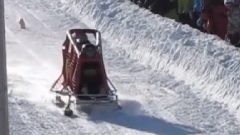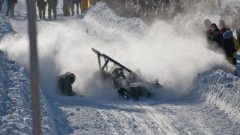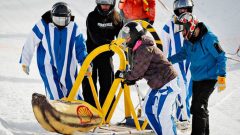It sounds like a university student prank..build a “concrete” toboggan, load a few people on board and race down a steep snow-covered hill.

The Queen’s University engineering team speeds down the hill in Calgary at the 2012 event (YouTube: I. Valoria)
It’s actually an organised event called “The Great Northern Concrete Toboggan Race”.(GNCTR)
Started some 40 years ago, teams from engineering faculties at universities across Canada build their sleds and travel to the event held in different locations each year as the compete for the Canadian Society for Civil Engineering Cup.
This year the event is to be held in London, Ontario, at Boler Mountain, hosted by Western University.
Matt Johnson, is vice-president of communications for the GNCTR and a graduate engineering student from Western
Listen
This year there are approximately 450 students from more than 20 universities and colleges across Canada and one from the United States for the competition from January 29 to February 1.
The annual event is one of the largest student engineering competitions in Canada and challenges teams to apply knowledge learned in the engineering classroom to create a sled whose runners or running surfaces are made entirely of concrete.
So, while it’s certainly fun, it’s also a very practical learning experience supported by industry.
The sled has to support five riders and weigh less than 300lbs. (136 kg).

Occasionally there are mishaps, such as this one in Calgary in 2012. Helmets and roll bars are mandatory (Ian Coburn)
The sleds can reach speeds up to 80km/h as the zip down the hill, so a brake is required, along with a roll bar.
Before the race however, a panel of judges composed of engineering professors and industry professionals will evaluate each team’s design and construction.
Secondary prizes will then be awarded in categories such as “sustainability” i.e. involving the use of recycled material, locally sourced material, and post-use recyclability.

Sleds are usually “themed” and teams sport uniforms as in the case of the “Bananas in Pyjamas” from the University of Alberta in 2010 (U alberta)
The teams also present a technical report on the design of their sled.
The sleds also have a theme, and the teams inevitably dress up to suit the theme, part of the “spirit” award, and best uniform award
Matt Johnson says interest in the competition is growing each year and has begun attracting international attention.
GNCTR VIDEO- from the GNCTR 2014 website







For reasons beyond our control, and for an undetermined period of time, our comment section is now closed. However, our social networks remain open to your contributions.